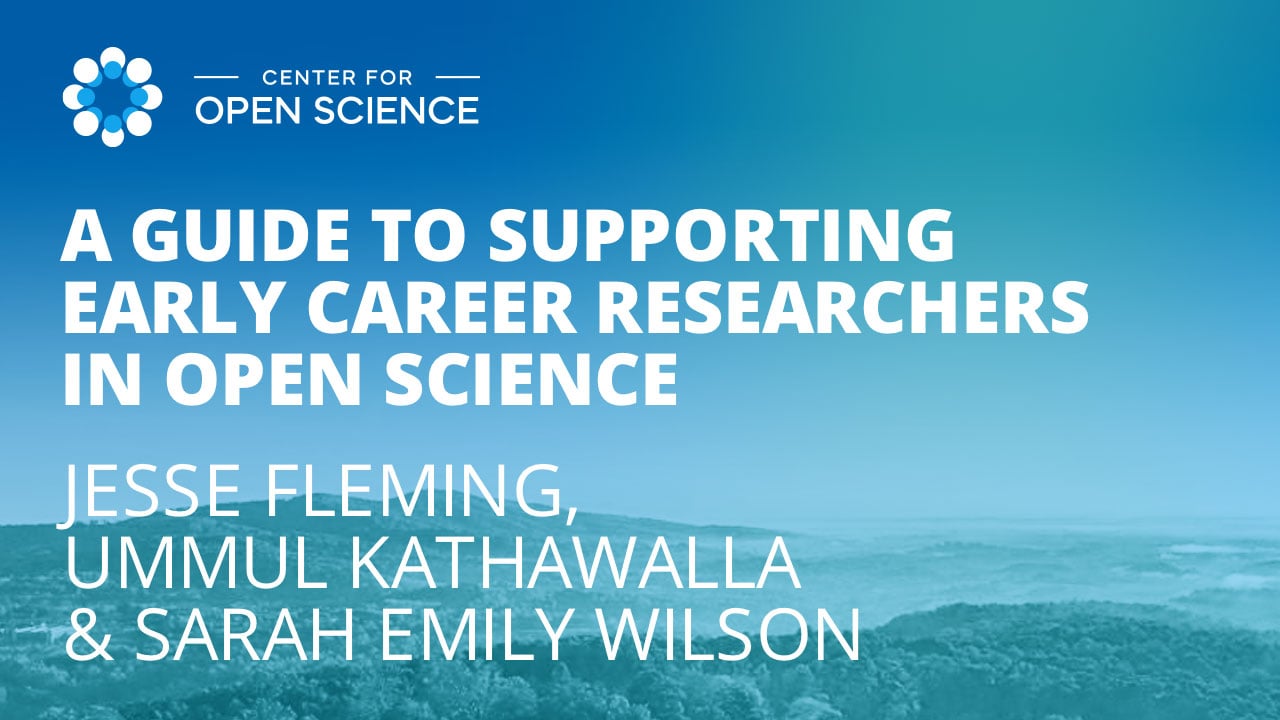
Supporting early career researchers in their open science journey is critical for the future of the field. The development of open science behaviors, however, often requires guidance from faculty and colleagues.
This webinar, originally hosted on April 7, 2022, provided practical and concrete steps for early career researchers to follow to advance their open scholarship practice. Additionally, it offered tips about how to mentor early career researchers in the development of open science behaviors that will last throughout their careers.
Prompting the discussion around the need to support early career researchers is data from the Open Scholarship Survey which suggests emerging scholars are more likely to be receptive to open scholarship practices than established researchers.
Speakers included:
Fleming kicked-off the webinar by introducing four initial steps early career researchers can take to ease into open science practices: understand the “why,” start small, integrate practices into your workflow, and turn challenges into advantages.
“Look at the reproducibility crisis. Look at preregistration and Registered Reports and how they might impact findings and outcomes,” Fleming said. “Once you do that, then you can find your own ‘why’ and find out how open science is going to be relevant to you and to your own research questions.”
Fleming also encouraged early career researchers to start small in their adoption of open science practices, sharing points of entry that could work for individual researchers to start implementing today. Growing and incorporating those practices into current research workflows is also essential according to Fleming, making open science behaviors easier across the lifetime of a project rather than an afterthought.
“If these [open science] practices speak to you – if they’re important to you – then we have to find a way to use these practices to our advantage and not just focus on the challenges they present,” Fleming said.
Dr. Kathawalla shared her personal experience with preprints and Registered Reports as well as her paper, “Easing Into Open Science: A Guide for Graduate Students and Their Advisors,” and the accompanying Open Science Framework (OSF) page that is continually updated with new resources for early career researchers looking to adopt open science behaviors, including information on preprints, preregistration, Registered Reports, data sharing, and more.
“There’s no right way to do open science,” Dr. Kathawalla said. “You can really start with any of these behaviors or changes. It’s about moving science into being more transparent and thinking about things in a way that’s thoughtful and really trying to move the field of since forward.”
Dr. Kathawalla highlighted other open science behaviors that researchers can start implementing immediately, including establishing a journal club to prompt conversation and collaboration or focus on transparent manuscript writing, highlighting thinking and decision making. Ultimately, Dr. Kathawalla noted, more open science behaviors can be adopted across the entire research cycle, from the point of conceptualization to dissemination.
A focus on lateral mentoring as a means to implement widespread open science efforts was also discussed during the webinar.
“Some of what we talk about is insitutation not adopting [open science] practices or being slow to adopt them more broadly,” Dr. Wilson said. “I think mentoring is a great way of helping address that. You bring in more people and you bring in a stronger community. That means the community as a whole can press for these changes on a broader scale.”
Dr. Wilson also discussed ways that mentoring enabled her decision to engage in an open dissertation from the beginning of her doctoral studies.
Early career researchers learning to advance open science practices can watch the webinar here. For more resources, visit COS’s STEM Education Hub and the Open Scholarship Knowledge Base (OSKB).
Stay connected! Sign up here to receive information about upcoming events and developments in open science.

6218 Georgia Avenue NW, Suite #1, Unit 3189
Washington, DC 20011
Email: contact@cos.io

Unless otherwise noted, this site is licensed under a Creative Commons Attribution 4.0 International (CC BY 4.0) License.
Responsible stewards of your support
COS has earned top recognition from Charity Navigator and Candid (formerly GuideStar) for our financial transparency and accountability to our mission. COS and the OSF were also awarded SOC2 accreditation in 2023 after an independent assessment of our security and procedures by the American Institute of CPAs (AICPA).
We invite all of our sponsors, partners, and members of the community to learn more about how our organization operates, our impact, our financial performance, and our nonprofit status.